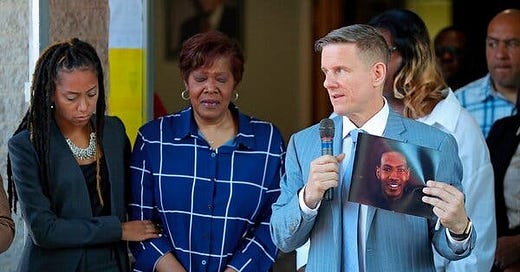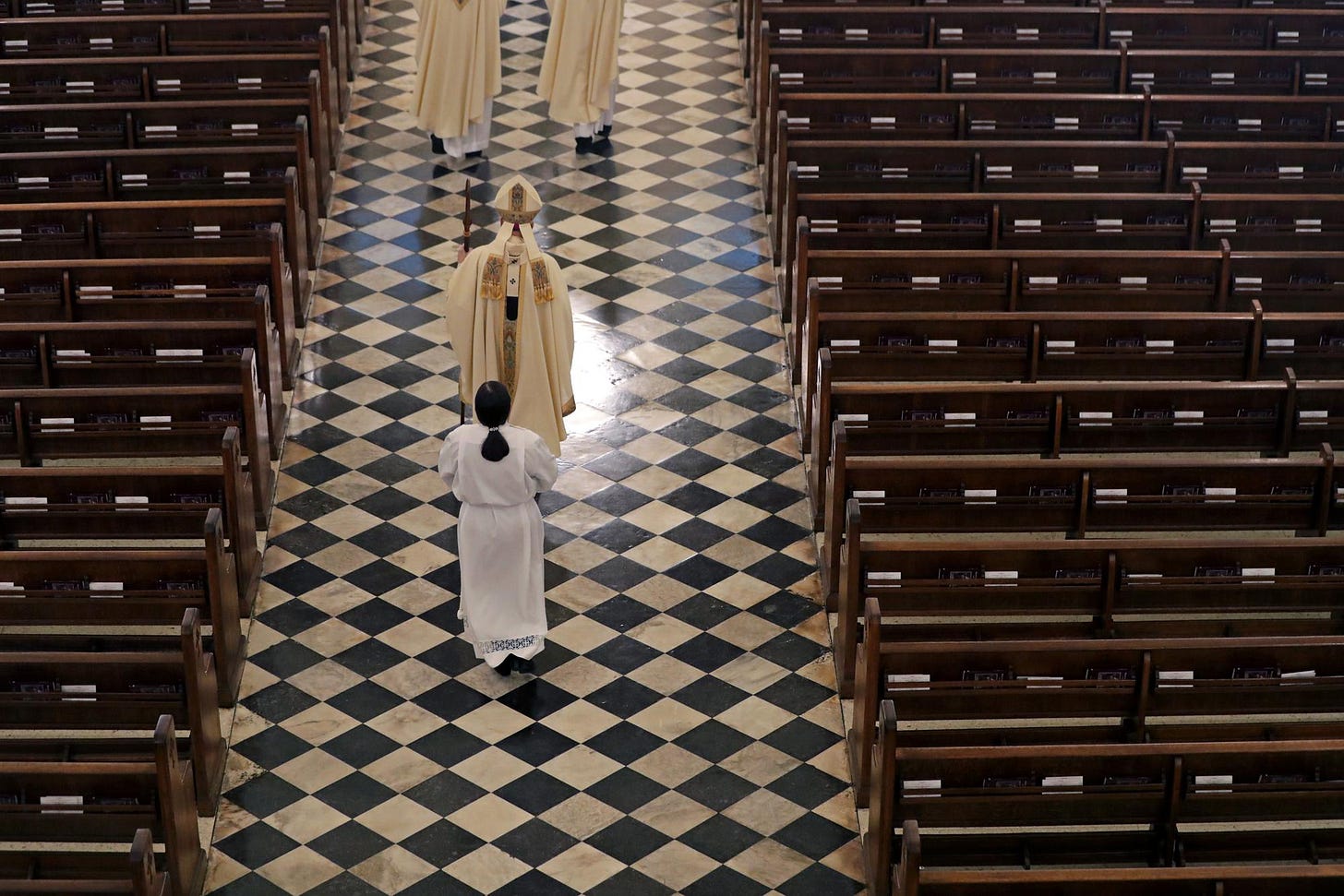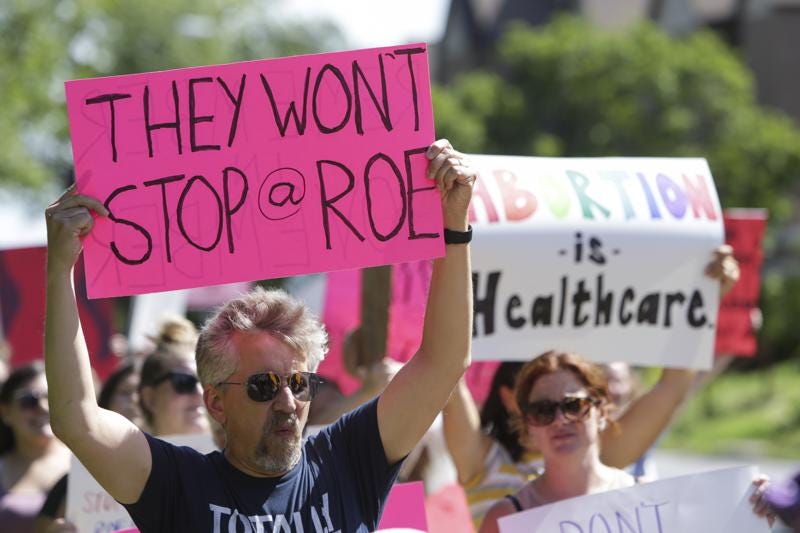The Full Belmonte, 7/3/2022

“An unspecified number of police officers in Akron, Ohio, were placed on administrative leave after the fatal shooting of a 25-year-old Black man who the police said continued to drive after they tried to pull him over for an unspecified traffic violation.
Officials in Akron were bracing for protests that could follow the release on Sunday of footage of the shooting, which took place after the driver, Jayland Walker, exited his vehicle and fled on foot to a parking lot early Monday morning.
A lawyer for the family of Mr. Walker said the footage shows that he was running away, unarmed, when police officers fired at him more than 90 times.
The lawyer, Bobby DiCello, reviewed footage of the shooting on Thursday. His legal team also visited the medical examiner’s office on Friday and reviewed the autopsy, which has not been finalized. Mr. DiCello said it showed that Mr. Walker had been struck at least 60 times.
The Summit County Medical Examiner could not immediately be reached on Saturday.
‘I’ve been a trial lawyer for 22 years and I’ve never seen anything remotely close to what that video is going to show,’ Mr. DiCello said of the footage to be released. He said eight officers were involved in the shooting, though the authorities did not specify a number.
An initial police statement, which was released on Tuesday, said officers tried to stop Mr. Walker for an unspecified traffic violation while he was driving at around 12:30 a.m. After Mr. Walker did not stop, officers continued to pursue his vehicle, the police said.
The police said Mr. Walker discharged a gun while he was driving, but the statement did not specify how they knew that. After a few minutes, Mr. Walker slowed down his car and exited it while it was still moving; officers then chased him on foot into a parking lot, the police said.
The statement said officers opened fire after ‘actions by the suspect caused the officers to perceive he posed a deadly threat to them.’” Read more at New York Times
Representative Pramila Jayapal speaks at a rally.Photo: AFGE/via Wikimedia Commons
“As Republican attacks on transgender people continue nationwide, five Democratic House representatives have introduced a Transgender Bill of Rights that would protect trans and non-binary people.
The bill would ban discrimination against gender identity and expression in public accommodations, employment, housing, and credit. The bill would also ensure access to gender-affirming medical care — including abortion and contraception — and would ban forced surgery on intersex children and infants. Intersex individuals are often subject to unnecessary genital surgeries before they can provide informed consent.” Read more at LGBTQ Nation
“A Minnesota law went into effect Friday legalizing edibles containing small amounts of THC, the component in cannabis that provides a high, apparently surprising some Republicans, at least one of whom said he voted for the provision unknowingly.
The law permits the sale of edibles and beverages containing up to 5 milligrams of hemp-derived THC per serving. Most edibles in states where recreational cannabis is fully legalized contain 10 milligrams per serving.
The bill’s author, state Rep. Heather Edelson (D), said in a statement that ‘Minnesotans 21 and older will now be able to obtain the products they want in a safe and regulated manner.’
She added that the legislation was drafted in concert with the state agriculture and pharmacy boards.
The law, which passed the Republican-controlled state Senate in May, was signed into law by Gov. Tim Walz (D) last month. But some Republicans told the Star Tribune after the law went into effect that they were caught off guard.
State Sen. Jim Abeler, a Republican from a Minneapolis suburb, told the newspaper that he hadn’t realized the bill broadly legalized products containing THC. He said he thought it had only permitted delta-8 THC, which provides milder effects, though it also legalized the sale of delta-9 THC, which causes stronger feelings more commonly associated with a high from cannabis products. Abeler did not immediately respond to a request for comment.” Read more at Washington Post
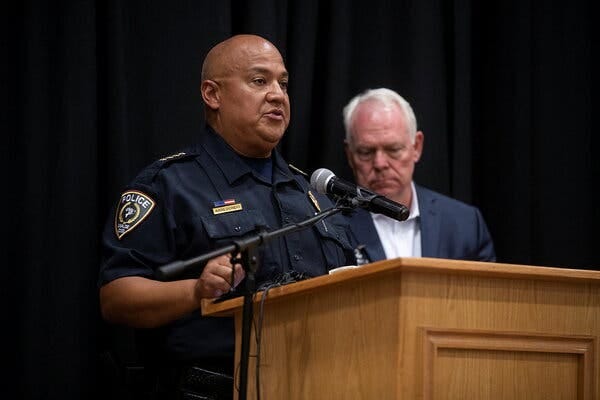
“Pete Arredondo, the chief of the school district police force in Uvalde, Texas, resigned as a member of the Uvalde City Council on Friday amid continued outrage over the slow police response to a shooting at Robb Elementary School in May.
In a letter addressed to the city, Mr. Arredondo said that after much consideration, ‘it is in the best interest of the community to step down as a member of the City Council for District 3 to minimize further distractions.’
He added that the mayor, the city council and the city staff ‘must continue to move forward to unite our community, once again.’” Read more at New York Times
Search
FBI opens sweeping probe of clergy sex abuse in New Orleans
“NEW ORLEANS (AP) — The FBI has opened a widening investigation into sex abuse in the Roman Catholic Church in New Orleans going back decades, a rare federal foray into such cases looking specifically at whether priests took children across state lines to molest them, officials and others familiar with the inquiry told The Associated Press.
More than a dozen alleged abuse victims have been interviewed this year as part of the probe that’s exploring among other charges whether predator priests can be prosecuted under the Mann Act, a more than century-old, anti-sex trafficking law that prohibits taking anyone across state lines for illicit sex.
Some of the New Orleans cases under review allege abuse by clergy during trips to Mississippi camps or amusement parks in Texas and Florida. And while some claims are decades old, Mann Act violations notably have no statute of limitations.
‘It’s been a long road and just the fact that someone this high up believes us means the world to us,’ said a former altar boy who alleged his assailant took him on trips to Colorado and Florida and abused him beginning in the 1970s when he was in the fifth grade. The AP generally does not identify people who say they have been sexually assaulted.” Read more at AP News
“(CNN)A large group of people carrying flags and shields marched along downtown Boston's Freedom Trail Saturday, according to the Boston Police Department -- and video footage of the group obtained by CNN shows the flags bearing the symbol of the White nationalist Patriot Front group.
Police received a call at 12:30 p.m. that around 100 people were protesting, walking on Congress Street toward the Old State House and City Hall Plaza, BPD Officer Kim Tavares told CNN. No arrests were made, nor was their route known, Tavares said. The group eventually boarded a train and departed from the scene, the officer added.
Social media video posted online shows dozens of individuals clutching shields and at least two different flags, including Patriot Front flags and upside-down US flags. Last month, a group believed to be affiliated with the Patriot Front was arrested after authorities said they planned to riot at a Pride event in Idaho.” Read more at CNN
“BIRMINGHAM, Ala. (AP) — Emails and phone calls from same-sex couples, worried about the legal status of their marriages and keeping their children, flooded attorney Sydney Duncan’s office within hours of the Supreme Court’s decision eliminating the constitutional right to abortion.
The ruling last week didn’t directly affect the 2015 decision that paved the way for same-sex marriage. But, Duncan said, it was still a warning shot for families headed by same-sex parents who fear their rights could evaporate like those of people seeking to end a pregnancy.
‘That has a lot of people scared and, I think, rightfully so,’ said Duncan, who specializes in representing members of the LGBTQ community at the Magic City Legal Center in Birmingham.
Overturning a nearly 50-year-old precedent, the Supreme Court ruled in a Mississippi case that abortion wasn’t protected by the Constitution, a decision likely to lead to bans in about half the states. Justice Samuel Alito said the ruling involved only the medical procedure, writing: ‘Nothing in this opinion should be understood to cast doubt on precedents that do not concern abortion.’
But conservative Justice Clarence Thomas called on his colleagues to reconsider cases that allowed same-sex marriage, gay sex and contraception.
The court’s three most liberal members warn in their dissent that the ruling could be used to challenge other personal freedoms: ‘Either the mass of the majority’s opinion is hypocrisy, or additional constitutional rights are under threat. It is one or the other.’
That prospect alarms some LGBTQ couples, who worry about a return to a time when they lacked equal rights to married heterosexual couples under the law. Many, fearful that their marital status is in danger, are moving now to square away potential medical, parental and estate issues.” Read more at AP News
“WASHINGTON (AP) — In the first week after the Supreme Court stripped away a woman’s constitutional right to have an abortion, Democrats and aligned groups raised more than $80 million, a tangible early sign that the ruling may energize voters.
But party officials say donors are giving much of that money to national campaigns and causes instead of races for state office, where abortion policy will now be shaped as a result of the court’s decision. That’s where Republicans wield disproportionate power after more than a decade of plunging money and resources into critical but often-overlooked contests.
The fundraising disparity offers an example of how a lack of long-term planning can lead to both a structural disadvantage and an exasperated Democratic base. Short of the votes to pass legislation through a gridlocked and narrowly divided Congress, the right to abortion now appears to be the latest issue ceded largely to the states. That’s after failed Democratic efforts to expand voting rights, limit gerrymandering and significantly stiffen gun laws.” Read more at AP News
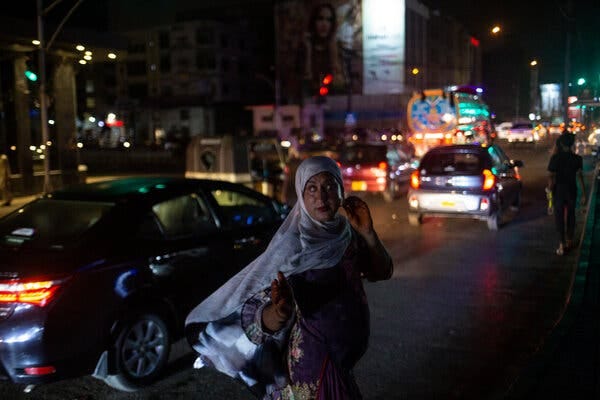
“KARACHI, Pakistan — Four years ago, Pakistan stepped to the forefront of transgender rights worldwide, enacting a law that prohibits discrimination against transgender people in schools, workplaces and public settings, and guarantees them the right to choose their gender on official documents.
Pakistan, a nation known for religious conservatism that still outlaws same-sex relations, joined a small list of countries — only about a dozen at the time, according to the United Nations — with similar transgender protections written into law, raising hopes for a historic turn in the lives of people long forced to survive on society’s fringes.
It meant, for some, that they could emerge from the shadows, a moment captured by the debut that year of Marvia Malik, the country’s first transgender television news anchor.
But in Pakistan, as in other countries around the world, guarantees written into law do not always translate to reality, do not erase prejudices and, most acutely, do not ensure security. A spate of violent attacks in Pakistan, several of them fatal, have targeted transgender people.
In the span of several days in March, four transgender people were killed and others were injured in a series of attacks in northwestern Pakistan. In one instance, gunmen on motorcycles opened fire on transgender people in Mardan, killing one and wounding another, according to local reports.
‘We welcome the passage of the laws to protect the transgender community’s rights, but changing the society’s mind-set is a big challenge,’ said Bindiya Rana, a transgender community leader in Karachi. ‘A certain section of people consider transgender persons either their property or as less than human.’” Read more at New York Times

“Pressed by Supreme Court decisions diminishing rights that liberals hold dear and expanding those cherished by conservatives, the United States appears to be drifting apart into separate nations, with diametrically opposed social, environmental and health policies.
Call these the Disunited States.
The most immediate breaking point is on abortion, as about half the country will soon limit or ban the procedure while the other half expands or reinforces access to reproductive rights. But the ideological fault lines extend far beyond that one topic, to climate change, gun control and L.G.B.T.Q. and voting rights.
On each of those issues, the country’s Northeast and West Coast are moving in the opposite direction from its midsection and Southeast — with a few exceptions, like the islands of liberalism in Illinois and Colorado, and New Hampshire’s streak of conservatism.
Even where public opinion is more mixed, like in Ohio, Wisconsin, Georgia, North Carolina and Texas, the Republican grip on state legislatures has ensured that policies in those states conform with those of the reddest states in the union, rather than strike a middle ground.
The tearing at the seams has been accelerated by the six-vote conservative majority in the Supreme Court, which has embraced a muscular states-rights federalism. In the past 10 days the court has erased the constitutional right to an abortion, narrowed the federal government’s ability to regulate climate-warming pollution and blocked liberal states and cities from barring most of their citizens from carrying concealed guns outside of their homes.
‘They’ve produced this Balkanized house divided, and we’re only beginning to see how bad that will be,’ said David Blight, a Yale historian who specializes in the era of American history that led to the Civil War.
Historians have struggled to find a parallel moment, raising the 19th-century fracturing over slavery; the clashes between the executive branch and the Supreme Court in the New Deal era of the 1930s; the fierce battles over civil rights during Reconstruction and in the 1950s and early 1960s; and the rise of armed, violent groups like the Weather Underground in the late ’60s.
For some people, the divides have grown so deep and so personal that they have felt compelled to pick up and move from one America to the other.
Many conservatives have taken to social media to express thanks over leaving high-tax, highly regulated blue states for red states with smaller government and, now, laws prohibiting abortion.
Others have transited the American rift in the opposite direction.
‘I did everything I could to put my mouth where my money was, to bridge the divide with my own actions,’ said Howard Garrett, a Black, gay 29-year-old from Franklin, Tenn., who ran for alderman in recent years, organized the town’s first Juneteenth celebration and worked on L.G.B.T.Q. outreach to local schools, only to be greeted with harassment and death threats.
Mr. Garrett moved to Washington, D.C., last year. ‘People were just sick in their heart,’ he said, ‘and that was something you can’t change.’
On abortion, history seems to be riffing on itself.
Both supporters and opponents of abortion rights see a parallel to the abolition of slavery.
As states like Illinois and Colorado vow to become ‘safe harbors’ for women in surrounding states seeking to end their pregnancies, abortion rights advocates see an echo of past efforts by antislavery states in the North. But abortion opponents see themselves as emancipating the unborn, and often compare the Roe decision’s treatment of the fetus to the Dred Scott ruling in 1857 that denied Black people the rights of American citizenship.” Read more at New York Times
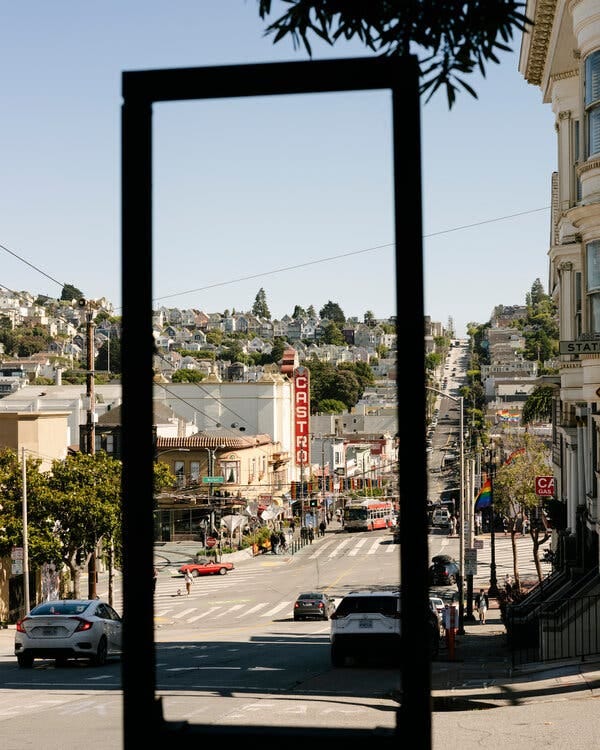
“SAN FRANCISCO — Cleve Jones has lived in the Castro neighborhood for nearly 50 years, almost from the day he graduated from high school in Phoenix and hitchhiked to California.
He has been a political and cultural leader, organizing gay men and lesbians when the AIDS epidemic devastated these streets in the early 1980s. He created the nationally recognized AIDS Memorial Quilt from a storefront on Market Street. He was a face of the anger and sorrow that swept the Castro in 1978 after the assassination of Harvey Milk, the first openly gay man elected to the Board of Supervisors.
Mr. Jones has helped define the Castro, dancing at its gay bars seven nights a week when he was younger, gathering with friends for drinks and gossiancisco Police Department, after Mr. Jones began to introduce himself.
But in May, Mr. Jones, 67, left for a small home with a garden and apple and peach trees 75 miles away in Sonoma County after the monthly cost of his one-bedroom apartment soared from $2,400 to $5,200.

‘I walk around the neighborhood that encouraged me for so many decades, and I see the reminders of Harvey and the Rainbow Honor Walk, celebrating famous queer and trans people,’ Mr. Jones said as he led a visitor on a tour of his old neighborhood, pointing out empty storefronts and sidewalks. ‘I just can’t help but think that soon there will be a time when people walking up and down the street will have no clue what this is all about.’
Housing costs are a big reason for that. But there are other factors as well.
L.G.B.T.Q. couples, particularly younger ones, are starting families and considering more traditional features — public schools, parks and larger homes — in deciding where they want to live. The draw of ‘gayborhoods’ as a refuge for past generations looking to escape discrimination and harassment is less of an imperative today, reflecting the rising acceptance of gay and lesbian people. And dating apps have, for many, replaced the gay bar as a place that leads to a relationship or a sexual encounter.
Many gay and lesbian leaders said this might well be a long-lasting realignment, an unexpected product of the success of a gay rights movement, including the Supreme Court’s recognition of same-sex marriage in 2015, that has pushed for equal rights and integration into mainstream society.
There are few places where this transformation is more on display than in the Castro, long a barometer of the evolution of gay and lesbian life in America. It is a place where same-sex couples crammed the streets, sidewalks, bars and restaurants in defiance and celebration as L.G.B.T.Q. people in other cities lived cloistered lives.” Read more at New York Times
“DALLAS — The rollback of abortion rights has been received by many American women with a sense of shock and fear, and warnings about an ominous decline in women’s status as full citizens.
But for some women, the decision meant something different: a triumph of human rights, not an impediment to women’s rights.
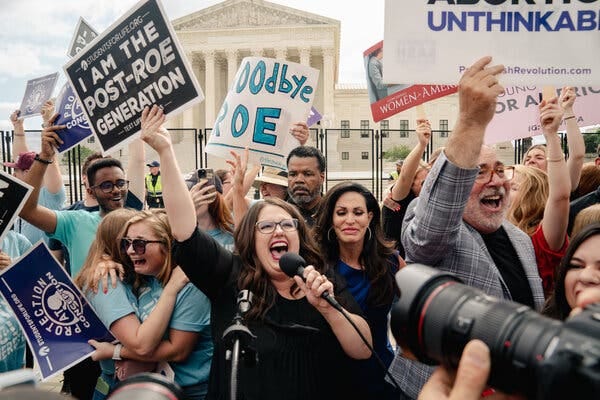
The Supreme Court decision overturning Roe v. Wade was a political victory, accomplished by lobbyists, strategists and campaign professionals over the course of decades. But it was also a cultural battle, fought by activists across the country including those in the exact demographic that abortion-rights advocates warn have the most to lose in the new American landscape: young women.
Often pointed to by anti-abortion leaders as the face of the movement, a new generation of activists say they are poised to continue the fight in a post-Roe nation.
Many, but not all of them, are Christian conservatives, the demographic that has long formed the core of the anti-abortion movement. Others are secular and view their efforts against abortion as part of a progressive quest for human rights. All have grown up with once unthinkable access to images from inside the womb, which has helped convince them that a fetus is a full human being long before it is viable.
Many believe the procedure should be banned at conception — that even the earliest abortion is effectively murder. But they embrace the mainstream anti-abortion view that women are victims of the abortion ‘industry’ and should not be prosecuted, putting them at odds with the rising ‘abolitionist’ wing of the movement calling for women to be held legally responsible for their abortions.” Read more at New York Times
FILE - Ricky Martin poses for photographers upon arrival at the premiere of the film 'Elvis' at the 75th international film festival, Cannes, southern France, May 25, 2022. A judge has issued a restraining order against Martin, police said Saturday, July 2, 2022. (Photo by Vianney Le Caer/Invision/AP File)
“SAN JUAN, Puerto Rico (AP) — A judge has issued a restraining order against Puerto Rican superstar Ricky Martin, police said Saturday.
The order was signed Friday, and authorities visited an upscale neighborhood in the north coastal town of Dorado where the singer lives to try to serve the order, police spokesman Axel Valencia told The Associated Press.
‘Up until now, police haven’t been able to find him,’ Valencia said.
Martin’s publicist did not immediately return a message asking for comment.
It was not immediately known who requested the restraining order. Valencia said he could not provide further details because the order was filed under Puerto Rico’s domestic violence law.
El Vocero, a Puerto Rico newspaper, said the order states that Martin and the other party dated for seven months. The report quotes the order as sying they broke up two months ago, but the petitioner says Martin did not accept the separation and has been seen loitering near the petitioner’s house at least three times.” Read more at AP News
Marta Kauffman said after the murder of George Floyd, ‘I began to wrestle with my having bought into systemic racism in ways I was never aware of.’ Photograph: Kevin Winter/Getty Images
“The co-creator of the TV sitcom Friends is planning to donate $4m to an African and African American studies project because she’s so ‘embarrassed’ by – and feels such ‘guilt’ at – the white homogeneity of the characters on the classic coming of age series.
Marta Kauffman told the Los Angeles Times that she intends for her planned gift to fund the Marta F Kauffman ’78 Professorship in African and African American Studies at her alma mater, Brandeis University, a liberal arts college in Massachusetts.
Kauffman said it was initially ‘difficult and frustrating’ to see Friends criticized for its lack of diverse characters in a show that ran for 10 seasons after it premiered in 1994, according to the Times. The show earned tens of millions of dollars in syndication and streaming for its creators and cast, including Jennifer Aniston, Courteney Cox, Lisa Kudrow, Matt LeBlanc, Matthew Perry and David Schwimmer.” Read more at The Guardian

